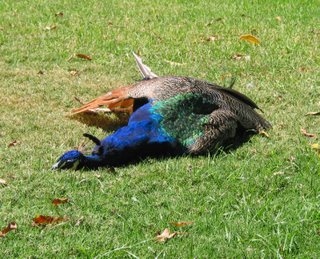
Permanent Vegetative State has been discussed on this blog previously. It, of course, was the medical diagnosis for Terri Schiavo and led to the great controversy about prognosis and treatment over a year ago. This condition which can be caused either by severe force injury to the brain or a prolonged period of lack of adequate blood supply and oxygen to the brain has been defined as the following:
Vegetative State: The Multi-Society Task Force on PVS, N Engl J Med 1994;330:1572-1579
No evidence of awareness of self or environment; inability to interact with others
No evidence of sustained, reproducible, purposeful or voluntary behavioural responses to visual, auditory, tactile or noxious stimuli
No evidence of language comprehension or expression
Intermittent wakefulness manifested by the presence of the sleep–wake cycle
Sufficiently preserved hypothalamic and brainstem autonomic functions to permit survival with medical and nursing care
Bowel and bladder incontinence
Variably preserved cranial nerve and spinal reflexes
"Persistent" = 1 month after traumatic or nontraumatic brain injury
"Permanent" = 3 months after nontraumatic, 1 year after traumatic brain injury
"Recovery of consciousness from a posttraumatic persistent vegetative state is unlikely after 12 months in adults and children. Recovery from a nontraumatic persistent vegetative state after three months is exceedingly rare in both adults and children."
The question I would like to pose now to my visitors is whether to consider a patient dead who has finally been diagnosed as in a Permanent Vegetative State? Another group of patients who are totally unresponsive and have complete and permanent loss of all brain function including the brain stem, can’t breathe and heart will stop despite artificial ventilation (“the brain dead”) are legally considered dead and are currently used as a source of organs for transplant. Should those in a Permanent Vegetative State be considered dead so that needed organ procurement from these patients can be permitted? These patients unlike those considered “brain dead” can breathe and may have a stable cardio-vascular system and appear as noted in the Task Force criteria above.
In these patients, does the apparent fact that they will never experience the conscious awareness of themselves or others or their environment represent the death of their personhood? Or does the warm body with eyes opening and closing and breaths taken and heart beating as seen by the family and others absolutely preclude that this class of patients will ever be considered dead but that they are just in some form of an endless kind of sleep, never to fully awaken and live a life? ..Maurice.
p.s. The photograph included in this posting was taken by me yesterday at the Los Angeles County Arboretum and Botanic Garden is that of a peacock. I have never seen a peacock assume this motionless lying down position and at first it seemed to me that it was dead but, indeed, as it finally got up and showed its feathers, it wasn’t!
No comments:
Post a Comment